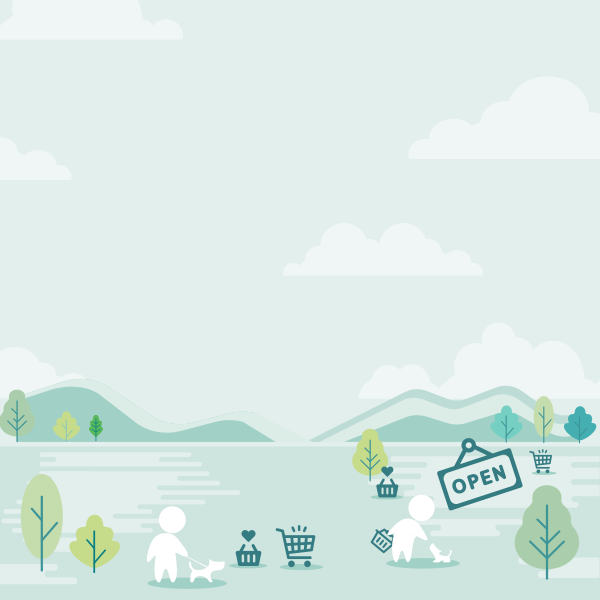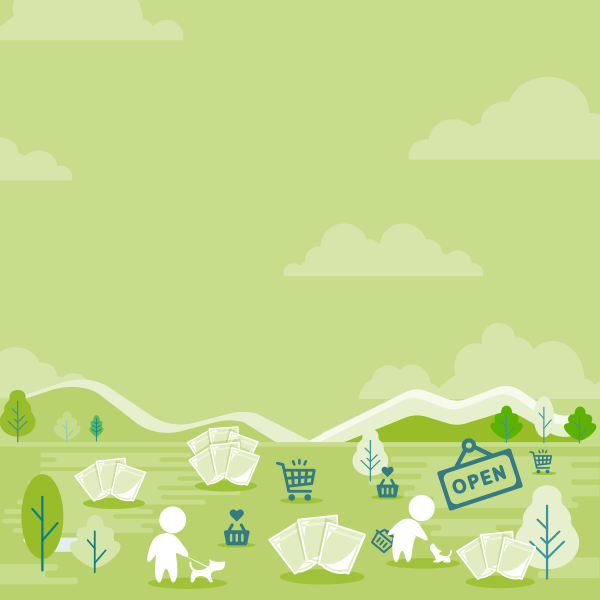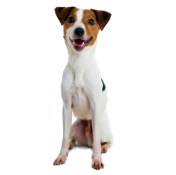Watching a beloved canine companion grow old and begin to slow down can be truly heart-wrenching.
If you’ve had the privilege of sharing many years with your dog, they have undoubtedly given you memories and taught you lessons that will live on long after they have gone. They have been a loyal companion, seeing you through many life events - there for your moments of celebration and for your moments of pain.
They deserve the best care as they age, and knowing how to support them as they move towards their twilight years is possibly the most important job you have as their owner and guardian.
Just like humans, dogs go through physical and mental changes as they grow older.
Other than those distinguished grey whiskers, do you know how to spot the signs of ageing in your dog? And just as importantly, do you know how to support them as they get older so they can continue to thrive for as long as possible?
The great news is that there is so much you can do to be your older dog’s Wellness Warrior. Providing them with great nutrition, keeping them mentally active and being proactive about spotting any changes means you can help your golden oldie maintain their vitality for as long as possible.
In this blog, we'll explore seven common signs of ageing in dogs and offer practical tips to enhance your senior dog’s wellbeing and feel empowered to support them through a combination of games, lifestyle and nutrition.
Sign Your Dog Is Getting Old Number 1: Change in Responses
As dogs age, their reflexes and responses may slow down. Just as an elderly relative might be a bit slower to respond and a little hard of hearing, it’s not unusual to see similar signs of ageing in your dog.
With a reduction in hearing, you may notice that your older dog also becomes noticeably less responsive to the world around them or startles when approached if they don’t see or hear you coming.
Your senior dog might forget or be slower to respond to commands they’ve known well throughout their life. Be patient, take things slowly, and offer gentle guidance and support.
Be patient and understanding with your older dog if they take a little longer to react to your voice or to do what you ask, are not as quick to react to sounds, or startle more easily.
Sign Your Dog Is Getting Old Number 2: Slowing Down or Difficulty Getting Around
Your once exuberant and enthusiastic companion might show less energy as they age. They may choose not to walk as far, and their walks may be more of a gentle plod than they once were.
You might notice that your older dog is finding it harder to get in and out of your vehicle or struggling with stairs. They may seem stiff or slow, especially after a snooze.
As dogs age they become less flexible. Joints begin to stiffen as the amount of lubricating fluid decreases and cartilage becomes thinner, making activity levels decrease as movement becomes more difficult.
Adding a scoop ofFlexi-K9 to your older dog’s daily food will support the natural production of joint lubricant as well as the body’s antioxidant and anti-inflammatory processes.
Sign Your Dog Is Getting Old Number 3. Sensory and Cognitive Decline
Senior dogs experience certain brain changes as part of the ageing process. As dogs age, their senses decrease. They taste less, see less and hear less. Their reflexes and responses may slow down.
Changes in your senior dog associated with cognitive decline can include:
- Reduced energy or alertness
- Disorientation, confusion or forgetfulness
- Increased anxiety
- Disinterest
- Separation struggles (even if they didn’t show separation anxiety when younger)
Their fading eyesight and hearing can mean they become more aware of novelty, which typically leads to an increase in pessimism as once familiar things appear new or take on a different appearance.
IntroducingCalm-K9 Senior Boost once your dog reaches the age of 7 can be a true game changer. The formula for this supplement is based on the most compelling research combined into a single solution, which can support your senior dog’s cognitive function. With its probiotics and vitamins, it is also packed with natural ingredients which have been shown to provide gut support and be beneficial and effective in the long-term preservation and improvement of eyesight.
Games to Enhance Optimism and Adaptability
Playing games to boost your older dog’s optimism can be hugely beneficial in helping them take the changes that happen during the ageing process in their stride.
By playing games that help grow your dog’s optimism and confidence when novelty appears you can recreate the socialisation period with your senior dog, much like you would a young puppy navigating a novel and curious world.
Game 1: Novelty Surprise Party
Use household items to create a physically appropriate obstacle course for your senior dog to navigate. Arrange the objects in whichever way you would like, and spread kibble or treats throughout (like a treasure hunt)! Make sure it’s safe and free from anything with height… In this game, you are not only providing your dog with a great way to keep their brain active with a low-impact exercise, you are also ditching the routine and keeping them mentally flexible!
Game 2: Scatter Feeding
Instead of feeding your dog from a bowl, provide breakfast by scattering it in the grass instead! This promotes and encourages use of your senior dog’s nose, is low impact, and will give them something fun to do for their food. Win! Win!
Find more super games to play with your older dog to keep them mentally and physically flexible in ourSenior Dog Bible.
Sign Your Dog Is Getting Old Number 4: Lack of Flexibility and Increased Frustration
As well as becoming more aware of novelty, older dogs will typically become much less flexible, and much more easily frustrated.
Think of an older person who is very much set in their ways. Just like humans, it’s not unusual for some intolerance and grumpiness to creep in during those senior years!
Imagine a puppy’s brain is like cooked spaghetti - flexible, with many learning opportunities available. By the time a dog reaches its senior years, and certain choices have been reinforced, there are often just a few very rigid pathways left. You can imagine these more like dry strands of spaghetti.
As a result, older dogs can quickly become upset if they are unable to do those very particular things in very particular ways.
Ditch the Routine to Encourage Flexibility
As your dog ages, it's crucial to help them adapt to change and become more flexible. "Ditch the Routine" involves breaking predictable patterns to reduce stress in your senior dog.
Vary meal times, walking routes, and activities to keep them mentally engaged and resilient to change.
Head over to the AbsoluteDOGS website (our sister company) to read more about the value ofDitch the Routine for dogs of all ages.
Sign Your Dog Is Getting Old Number 5. Increased Barking and Vocalising
Senior dogs may vocalise more due to neurological changes or other age-related factors. If you find your older dog is suddenly a little more inclined to bark at novelty, or has suddenly started barking in the middle of the night, age could be a factor.
Those optimism-boosting games will pay dividends here!
Check out our dedicatedBARKING! 4 Steps to a Quieter Companion! blog post for some top tips and strategies too.
Sign Your Dog Is Getting Old Number 6. Change in Sleep-Wake Cycles
Senior dogs may experience changes in their sleep patterns, with more frequent napping during the day and possible restlessness at night.
Provide a comfortable, quiet sleeping area and make sure your dog gets plenty of opportunities for quality, restful sleep day or night.
Sign Your Dog Is Getting Old Number 7. Change in Toileting
Incontinence is not uncommon in senior dogs, so if your older dog suddenly seems to forget all their housetraining this could be part of the ageing process.
Provide more frequent toilet breaks and consult your vet for advice to be sure there’s no other underlying issue that needs treatment.
Is My Dog Sad? How to Tell If Your Dog Is Sad
It's essential to differentiate between signs of ageing and signs of sadness in your senior dog. Some behaviours, like decreased joy or disinterest in activities, might be interpreted as signs of sadness. However, these are common signs of ageing in dogs and not necessarily indicators of sadness.
It’s important to cherish the memories of your dog’s youthful exuberance while also finding joy in the new ways they express happiness and contentment.
If you suspect your dog is genuinely feeling down, look for other signs like appetite changes, lethargy, and avoiding interactions. If you are concerned about your dog's emotional wellbeing, consult a vet or an animal behaviourist for guidance.
Supporting Your Senior Dog's Nutrition
A well-balanced diet with appropriate supplements can make a significant difference to your senior dog's vitality.
Read more about the7 Must Feed Ingredients for your Senior Dog’s Health so you know how best to support your older dog’s brain health, cognitive function, and overall wellbeing.
Adjusting the Reward Experience
With age, your senior dog's sensitivity to reinforcement may change. Experiment with new types of reward, such as low-impact exercises or different food textures, to keep them engaged and motivated.
Supporting Physical Fitness
Low-impact exercises tailored to your senior dog's capabilities can help maintain muscle mass and joint health. Warming up and cooling down before and after exercise is essential. Consider giving your dog a gentle massage to activate muscles and reduce stiffness.
Enjoying the Twilight Years
Caring for a senior dog can be a rewarding experience, but it requires understanding and compassion. As your loyal companion enters their golden years, be attentive to the signs of ageing and adjust their care accordingly.
Provide mental and physical stimulation, vary their routines, and ensure they receive proper nutrition and supplements to enjoy their twilight years with comfort and joy.
Remember, every dog is unique, so consult with your vet to create a tailored care plan that suits your senior dog's specific needs.
By offering love and support, you can make their ageing journey as fulfilling and happy as possible.





















